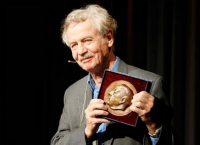










Rudolf Jaenisch is a Professor of Biology at MIT and a founding member of the Whitehead Institute for Biomedical Research. He is a pioneer of transgenic science, in which an animal’s genetic makeup is altered. Jaenisch has focused on creating genetically modified mice to study cancer and neurological diseases.
Biography
Jaenisch was born in 1942 in Germany into a family where medical careers were a tradition—both his father and grandfather were physicians. Thus, Jaenisch's enrollment in medical school at the University of Munich came as no particular surprise to his family. However, after taking basic science, anatomy, and physiology classes, Jaenisch felt his concentration waning. “By studying medicine, I really just lost interest,” he said. “I didn't like how it was taught. I didn't like the whole environment.”
Seeking a change, Jaenisch joined the Max Planck Institute of Biochemistry in Martinsried (Germany) to conduct experimental research while continuing his medical studies. For the first time, he considered research instead of medical practice for his future career. “I didn't take medical school very seriously after that. I didn't go to class anymore. I learned all from books for my exams, and I really worked only in the lab,” he said. Although the medical programs at that time required only a relatively simple thesis, Jaenisch went beyond the requisites of undemanding library research or laboratory experiments by studying bacteriophages. In the 1960s, bacteriophages had become important experimental tools for molecular biology. One of the leading German laboratories in this fledgling field was that of P. H. Hofschneider, whose research focused on the Escherichia coli phages ?X 174 and M13. Jaenisch joined Hofschneider's group as a medical student and performed his thesis work on phage replication and expression. Jaenisch graduated in 1967 with his M.D.
Research
Jaenisch’s first breakthrough occurred in 1974 when he and Beatrice Mintz showed that foreign DNA could be integrated into the DNA of early mouse embryos.They injected retrovirus DNA into early mouse embryos and showed that leukemia DNA sequences had integrated into the mouse genome and also to its offspring. These mice were the first transgenic mammals in history.
His current research focuses on the epigenetic regulation of gene expression, which has led to major advances in creating embryonic stem cells and “induced pluripotent stem" (IPS) cells, as well as their therapeutic applications. In 2007, Jaenisch’s laboratory was one the first three laboratories world-wide to report reprogramming cells taken from a mouse's tail into IPS cells. Jaenisch has since shown therapeutic benefits of IPS cell-based treatment for sickle-cell anemia and Parkinson's disease in mice. Additional research focuses on the epigenetic mechanisms involved in cancer and brain development.
Jaenisch’s therapeutic cloning research deals exclusively with mice, but he is an advocate for using the same techniques with human cells in order to advance embryonic stem cell research. However, in 2001 Jaenisch made a public case against human reproductive cloning, testifying to a U.S. House of Representatives subcommittee and an editorial in Science magazine.
Boehringer Mannheim Molecular Bioanalytics Prize (1996)
Gruber Prize in Genetics (2001)
Robert Koch Prize (2002)
Max Delbrück Medal (2006)
Massry Prize from the Keck School of Medicine (2008)
Wolf Prize in Medicine (2011)
National Medal of Science (2011)